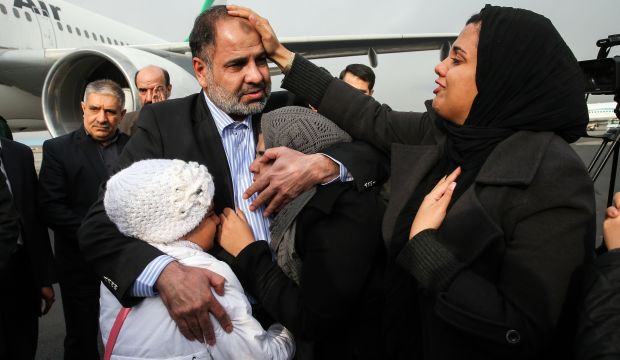
Just freed Iranian diplomat Nour-Ahmad Nikbakht hugs his wife (C) and daughters (L-R) after arriving in Tehran’s Mehrabad airport on March 5, 2015. (AFP Photo/ISNA/Amir Pourmand)
Sana’a, Asharq Al-Awsat—The rescue of an Iranian diplomat held hostage for almost two years by suspected Al-Qaeda militants in Yemen is a “serious indication of Iran’s involvement” in the turmoil-stricken Arab state, a senior Yemeni official told Asharq Al-Awsat.
The government official, who requested anonymity, said: “The presence of Iranian special forces on Yemeni soil became a forgone conclusion ever since the Houthis took over the capital Sana’a and the western coastal province of Al-Hudaydah on the Red Sea.”
Iranian diplomat Nour-Ahmad Nikbakht, who was seized by militants believed to be members of Al-Qaeda in the Arabian Peninsula (AQAP) in July 2013, arrived in Mehrabad airport in Tehran on Thursday, state media reported.
Tehran is suspected of supporting the Houthi movement which successfully took over the capital Sana’a and other strategic areas in Yemen in September.
“[Houthis] have facilitated the access of Iranian special forces and intelligence agents who are now living in Sana’a with complete freedom,” the source said.
The rescue operation came less than one week after Saudi diplomat Abdullah Al-Khalidi, held hostage in Yemen for almost three years, was freed.
The freeing of the Saudi diplomat “accelerated the release of the Iranian hostage,” the source added.
“The Iranians are trying to say that they have a strong presence on the Yemeni scene.”
The “blatant” presence of Iranian intelligence in Yemen, the official maintained, “violates the rules of politics, diplomacy and intelligence.”
Several Arab and Gulf officials have voiced concerns over Iran’s growing interference in Yemen, often citing the Houthi “coup” against Yemeni President Abd Rabbuh Mansur Hadi as evidence of the Islamic Republic’s influence in the country.
In a step indicative of Tehran’s support of the Houthis, an Iranian airliner carrying medical supplies and aid workers landed in Sana’a International Airport on Sunday—it was reportedly the first Iranian plane to land in the country for 25 years.
The rescue operation is the “primary fruit” of a newly signed aviation pact between Iran and Yemen’s Houthi rulers that will see 14 weekly flights between Tehran and Sana’a, the source added.
The official warned of serious consequences “unless regional countries act more swiftly to stop Iranian influence in Yemen.”
Meanwhile, a Yemeni official denied on Thursday claims carried by Iranian media that the hostage release was the result of a military operation carried out by Iranian forces in Yemen, SABA news agency reported.
